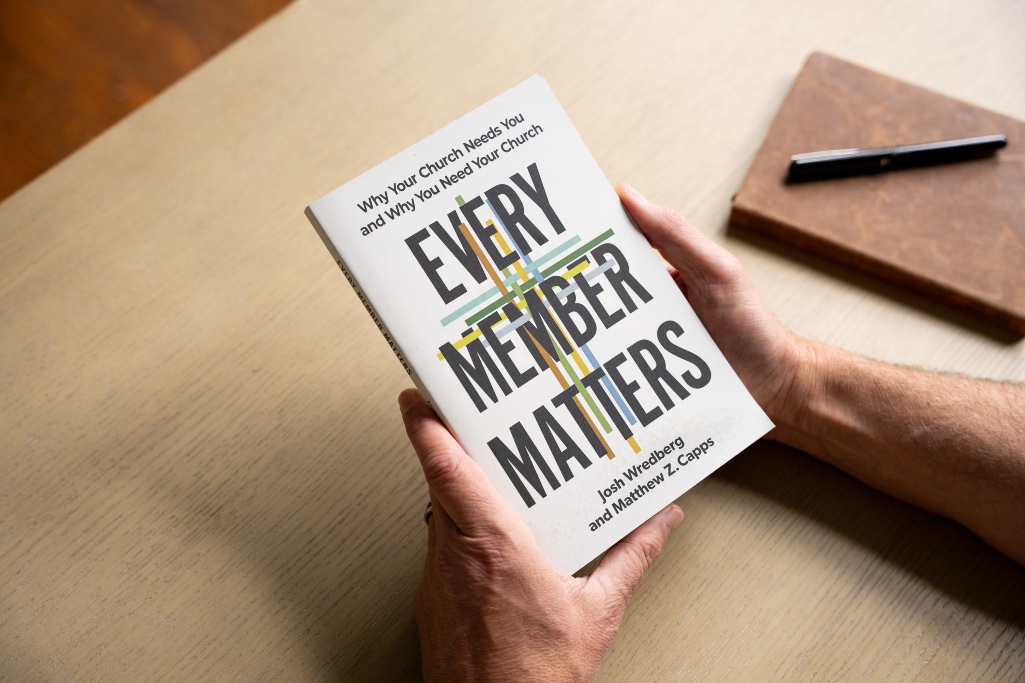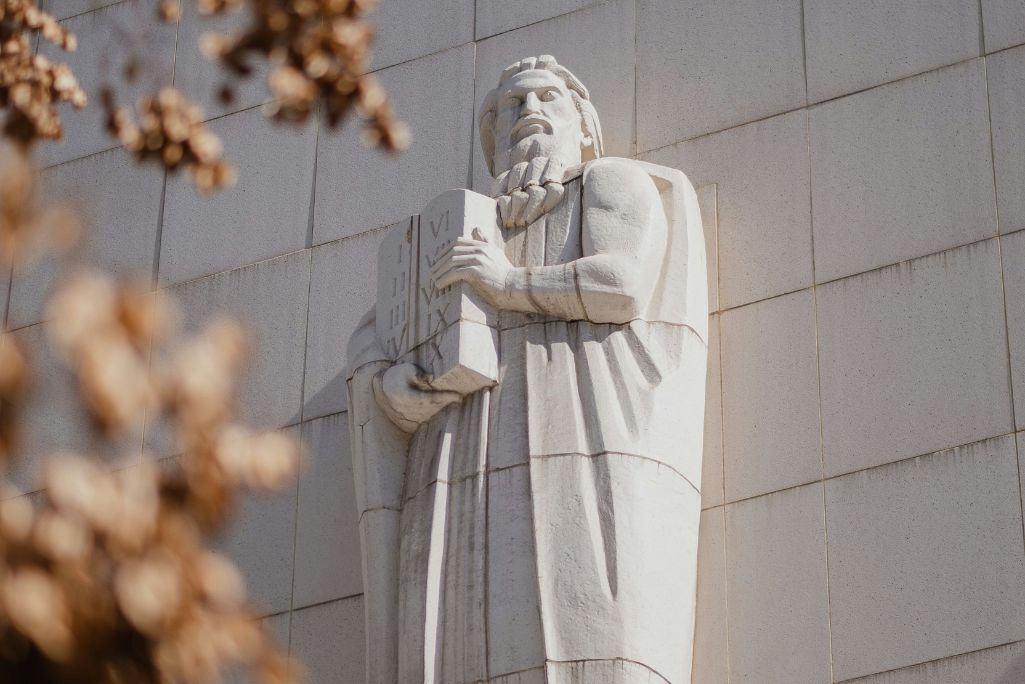
It’s election season. It’s a time when newscasters exaggerate for ratings, and politicians use fear for votes. It’s a time when some Christians retreat from the public square, and others become social media soldiers. Far too often, and unfortunately for Christians, politics put fallen hearts on full display as the pendulum of political discussion swings between “we the people” and “thus says the Lord.”
It’s good to be reminded, as Christians in America, that we are dual citizens. Our true citizenship is in heaven (Philippians 3:20). We are, in the truest sense, “sojourners” and “exiles” (1 Peter 2:11). We know America is our temporary home. It’s also important to remember that, temporarily, America is our home.
The question is, how are we supposed to think and act as citizens of the kingdom of God while simultaneously being citizens in the kingdom of man? How do we live in this tension? Especially in a particularly tense time? To answer this question, I’d like to offer a few thoughts about politics under the headings of principles, priorities, posture and practices.
What are the principles that guide our politics?
First, we must understand that civil government is a necessary endeavor for the common good. In Romans 13:1-4, the Apostle Paul makes it abundantly clear that God has granted the government the sword of justice. Now, this principle finds its genesis after the flood, where God calls us not to destroy life or we will face justice (Genesis 9:6). After all, the shedding of blood directly works against God’s call for humanity to be fruitful and multiply.
Because of this principle, civil government has developed for several purposes. First, to deter future crime. Second, to affirm the dignity and worth of every human. Third, to create a system in which human life can flourish under the common grace institution called civil government. Thus, we would say that God sets up civil governments for justice, peace and flourishing. Civil government has a right and obligation to carry out its good and proper work.
Now, we also recognize that we live in a fallen world, and those who hold power within the God-ordained civil government system are also sinful by nature. Those in power will not only fail to be obedient to their God-given office but will also sometimes abuse the power granted to them in their God-given office. Because of this, there will be times when we ask, “Is it ever legitimate to refuse obedience to civil authorities?”
The general principle should be — we will submit to civil authorities unless that authority commands us to do something God forbids or forbids us to do something God commands. The necessity of this qualification reminds us that while civil government is needed, it is also provisional. By provisional, I mean that government is something set in place for a limited time and purpose until something greater arrives (namely, the eternal kingdom of God). Thus, we live with the tension of knowing that in our fallen world, civil government is a necessary institution, but it is not an ultimate institution.
Jesus gets at this in Matthew 22 in a confrontation with the religious leaders plotting to trap him in His words. The Pharisees and Herodians asked a simple question: “Is it lawful to pay taxes to Caesar or not?” (Matthew 22:17).
Remember, Israel was under Roman rule at the time. If Jesus had said, “Pay your taxes to Rome,” the Pharisees would have charged Jesus with compromise or blasphemy. If Jesus had said, “Do not pay your taxes to Rome,” the Herodians would have charged him with insurrection or inciting political rebellion. Essentially, both sides were waiting for Jesus to come and reveal Himself either as a political messiah or a political revolutionary.
However, Jesus took the initiative away from the questioners and asked them to bring Him the coin for this tax. This coin (denarius) would have the head of Caesar on one side with the Latin inscription “Caesar, Son of the Divine,” and the words “high priest” on the other. Their question was political, but it was also about ultimate devotion. Note Jesus’ answer:
“‘Show me the coin used for the tax.’ They brought him a denarius. ‘Whose image and inscription is this?’ He asked them. ‘Caesar’s,’ they said to Him. Then He said to them, ‘Give, then, to Caesar the things that are Caesar’s, and to God the things that are God’s’” (Matthew 22:19-21).
On the one hand, Jesus acknowledges Caesar’s temporary rights as he carries out his God-given function in politics and government for the good of civilization by saying, “Give him his coin.” On the other hand, Jesus implies that while the coin bears Caesar’s image, Caesar bears God’s image. Thus, Caesar will answer to God for how he wielded the sword.
Do you see what Jesus is doing here? To those who wanted to overthrow the civil government, Jesus demanded that they render to Caesar what belonged to him. To those who wished to absolutize civil government, Jesus told them to render to God what is God’s.
The point is that civil government is a necessary endeavor for the common good — but it is also provisional. And while civil government is provisional, those who hold positions in government are under divine accountability. God established civil government to promote peace and justice, and thus, all politicians must ultimately answer to God Himself as they will be accountable to His standards of justice. It’s from this principle that we build our priorities.
What are the priorities that shape our politics?
In Mark 12:30-31, Jesus says, “Love the Lord your God with all your heart, with all your soul, with all your mind, and with all your strength. The second is, ‘Love your neighbor as yourself.’”
While this world is passing away, it is not ultimately unimportant. In the world, there are people. And those people live within the sphere of civil government. Therefore, we should not forfeit our responsibility to love our fellow citizens. Indeed, we bear great responsibility in this world to work for the good, for justice and for peace.
When Scripture instructs us to love God and love our neighbor as ourselves, we are given a clear mandate for proper engagement in this world. I think Albert Mohler captures this priority wonderfully in an article on faith and politics in which he writes: “Love of neighbor for the sake of loving God is a profound political philosophy that strikes a balance between the disobedience of political disengagement and the idolatry of politics as our main priority.”
In other words, love of neighbor for the sake of loving God constrains us from either political idealism or political escapism. We could argue, then, that we need a theologically informed political pragmatism. While wisdom reminds us that not every battle is worth spilling blood over, our Christian convictions demand us to stand for certain things that benefit the common good. We live in a democracy, and we have a voice.
With all this being said, we must not give in to the idealism that says, “The church cannot thrive unless our political system is a certain way or there is no hope.” We must also fight the temptation to escapism that says, “Since our political system is headed in a certain direction, there is no point.”
Political pragmatism says we will courageously work for our convictions toward the common good. That is our priority in being engaged in the political process, which then leads to our posture.
What is our posture when it comes to politics?
We are often frantically trying to adjust to the moving targets of living in an increasingly post-Christian America. We all understand that our current society has largely rejected Christian morality. In many ways, Christians have been pushed to the outskirts of what America has become.
As I heard someone say once, “In our increasingly secularized society, yesterday’s sinners have become today’s saints.” We are now a prophetic minority. We cannot assume that cultural Christianity will do the work; our convictions must be articulated with courage.
Again, none of us have some utopian dream that we can legislate in the kingdom of God through policy. No American political candidate can make “earth as it is in heaven.” Even still, our posture in this political season matters as exiled ambassadors. In Jeremiah 29:4-7, we are reminded of what the prophet told the exiled Israelites Nebuchadnezzar deported to Babylon:
“Build houses and live in them. Plant gardens and eat their produce. Find wives for yourselves, and have sons and daughters. Find wives for your sons and give your daughters to men in marriage so that they may bear sons and daughters. Multiply there; do not decrease. Pursue the well-being of the city I have deported you to. Pray to the Lord on its behalf, for when it thrives, you will thrive.”
The posture outlined here for ancient Israel is informative for the new covenant people of God. We are exiles, but we are not to be unengaged in our temporary home. Even more, we are to seek well-being and pray for our country of residence. A similar idea finds a place in Paul’s language of ambassadors from 2 Corinthians 5:20:
“Therefore, we are ambassadors for Christ, since God is making his appeal through us. We plead on Christ’s behalf: ‘Be reconciled to God.’”
Note, however, that Paul gives a particular purpose to our presence — to be an ambassador for Christ. Beyond our presence, we also have a purpose: proclaiming the message “be reconciled to God.” This is important to remember as we engage in the political process.
We are first and foremost ambassadors for Christ, and our primary message is “repent and be baptized.” As ambassadors of Christ, with the church as His embassy, we stand both on the soil of America and speak for the eternal kingdom we represent. We proclaim our King’s decrees and do so while we advocate for our convictions.
What are the practices that govern our politics?
With our principles, priorities and posture in mind — what practices should govern our political engagement? First and foremost, we should pray for our nation and our elected officials. Remember Paul’s words in 1 Timothy 2:1-4:
“First of all, then, I urge that petitions, prayers, intercessions, and thanksgivings be made for everyone, for kings and all those who are in authority, so that we may lead a tranquil and quiet life in all godliness and dignity. This is good, and it pleases God our Savior, who wants everyone to be saved and to come to the knowledge of the truth.”
We pray for our officials. Politics are much more manageable when we see it as impersonal. It’s also much easier to be venomous about politics when it’s impersonal. Politicians are people. And our politics affect people. Prayer is our first line of action, not our last resort.
As Proverbs 21 reminds us, God holds the hearts of kings in His hands. We pray for our officials so that we may live a quiet life with all dignity within our temporary home. In our country, this is one of the reasons we need to use our voice for the good of religious freedom. We do this so people can worship freely. We do this to protect the unborn, the vulnerable and those in need — all who are people created in the image of God and would benefit from freely hearing the gospel proclaimed in our churches.
Second, we need to be faithful church members. I fear that too many American Christians attend to political news more than they do their presence and accountability in the local church. As a pastor, I do not believe that the pulpit is a place for political lobbying or campaign speeches. The Lord’s Day gathering is for proclaiming the Word of God, worshiping with the saints and observing the ordinances. Yet, the pulpit shapes our political involvement in a very real sense.
Each week, we address theological issues that inform our political decisions. Even more, in our preaching, in our statements of faith and in our membership covenants, we outline our positions on issues of morality and ethics. We disciple people in the way of righteousness and justice. We also address political issues in other venues and gatherings of the church; for example, our elders recently taught a course on understanding and engaging in politics from a distinctly Christian perspective. We do all of this because our theology informs our policy. We encourage being faithful church members because it shapes us holistically and thus politically.
Third, it’s also important that we take up the responsibility and privilege of voting. In a democratic society like ours, rendering to Caesar means rendering responsible citizenship. A failure to vote can be a failure to seek the city’s well-being.
Voting is one means of advocating for our convictions for the good of others. Now, voting within our current two-party system isn’t always clear-cut, as many of our values have become a remnant of yesterday by many in society. It’s more and more the case that many people are feeling homeless when it comes to political parties. Thus, voting requires wisdom — but it is still an essential civic duty, especially in an increasingly secularized society.
Jonathan Leeman captures the responsibility to vote as follows: “When you vote in a democratic system, you’re actually participating in the role of the governing authorities…. Your job is to align your objectives with the purposes that God gives to the government in the Scriptures, such as punishing those who do evil and praising those who do good. Therefore, your vote requires you to make a moral evaluation about what’s good and what’s evil, or wise and unwise, and then to act on behalf of your evaluation. You are morally responsible for this evaluation and act of judgment.”
Beyond voting, we can also advocate for policies and critical issues by writing to our elected officials. For some, political engagement might even mean running for office as a way to contribute to the good of our nation. We should be thankful for Christians who serve the common good as elected officials. Indeed, we need more men and women with the courage of Christian conviction in these positions of political influence.
Conclusion
In the end, we need to remember, as Matthew 28 assures us, that Jesus “possesses all authority in heaven and on earth.” The Lord our God reigns over all things. Thus, civil government exists by Christ’s design and permission. Moreover, Jesus will one day judge the nations, their governments and their governing officials (Revelation 6:15-17).
Until then, be involved in the political process — as civil government is a necessary, even if temporary, endeavor for the common good. While we are Christians first, we are also Americans. We bear great responsibility in this world to work for the good, for justice and for peace.
As the general public becomes more apathetic or angered by politics, we, as Christians, need to be courageous in our convictions and civil in our actions. In short, we need to be intelligent, informed and engaged in the political structures of our temporary home from a distinctly Christian position.
(EDITOR’S NOTE — Matt Capps has served as the lead pastor of Fairview Baptist Church in Apex, N.C., since 2015. Matt earned his Bachelor of Arts at the University of North Carolina at Charlotte, a Master of Divinity with Biblical Languages at Southeastern Baptist Theological Seminary, a Doctor of Ministry in pastoral theology at Gordon-Conwell Theological Seminary and is currently a Ph.D. candidate at Ridley College. Matt and his wife Laura have three children.)


